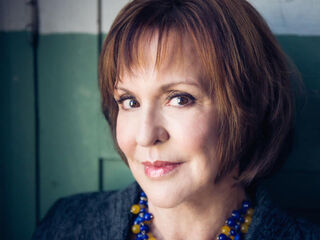Forgiveness
Interview with Jacquelyn Mitchard: The Good Son
A new novel explores the power of forgiveness and a mother's love.
Posted January 18, 2022 Reviewed by Abigail Fagan

Jacquelyn Mitchard's first novel, The Deep End of the Ocean, was one of those novels that made me want not just to be a reader but also a storyteller. Twenty-five years after her debut, Jacquelyn is the author of 24 books of fiction and non-fiction Her latest novel, The Good Son, is aptly described by Kristin Hannah as "a compelling novel about the aftermath of a crime in a small close-knit community." Here's more from my interview with Jacquelyn:
Jennifer Haupt: The relationship between Thea and her son Stefan, who spent three years in prison, feels so real. Is this story based on a real event? If not, what was your inspiration?
Jacquelyn Mitchard: I had thought often about the impossible choice Thea faces: Could you go on loving your best beloved if they did the worst possible thing? Then, some years ago, I was in the coffee line at a big hotel where I was speaking at a writer’s conference and the woman in front of me dropped her book. I picked it up and asked her if she was there for the conference. She said she stayed at this hotel every weekend when she visited her son in a nearby prison.
This boy had done exactly what Stefan was convicted of doing and was on drugs so he had no memory of the crime. She told me how she had once gone to the cemetery to put roses on the girl’s grave and the girl’s mother showed up. It was a terrifying moment, but the two women ended up sobbing in each other’s arms. The girl’s mother said, “You are luckier, because at least you can touch him.” So much came from that encounter. That scene makes its way, in a sense, into the novel, though all the circumstances were changed. I could not really place myself in the shoes or the psyche of those two mothers—for which I am profoundly grateful, by the way—but I could entirely understand the motivations for everything both of them did, from noble to crazy.
JH: I love the relationship between Thea and her ex-best friend, who rallies the town against Stefan. At times, I saw that they still cared about each other but couldn't get past what happened. Have you ever had a friendship break-up where love remained?
JM: I lost one of my closest friends, who’d been my confidante for 20 years, when I wrote an essay about a woman who had the same first name. My friend believed that it was about her. It was not, but nothing I could do could convince her that I was telling the truth. On reflection, her certainty that I was capable of using her for a 600-word essay, without her permission—and then lying about it—betrays much more about the way she felt about me than the actual incident does. But at the time, I was sick with grief.
Once in a while, when I go back to the city where I used to live, I run into one of this ex-friend's now-grown kids and they hug me tenderly and tell me all the news. And I think, what really went wrong there? We were like family. One of her daughters was my daughter’s godmother. I’ll never know for sure, but I think that the stated issue was not really the issue. That’s almost always true in a conflict.
JH: Do you think it's true that a mother's love is something that can never completely fade, no matter what their child has done?
JM: I absolutely think that. I watched a Ted Talk given by Sue Klebold, whose son, Dylan, was one of the Columbine school shooters; and I knew that there were people watching, thinking, how could she still love this monster? But I applauded her courage in telling her audience that she absolutely still loved Dylan, despite understanding she would live all her life with the shame and grief over what he had done. It did not seem impossible to me that she would still love the son she had raised and hold herself accountable for his despair and his crime.
JH: Did you start out with empathy for Thea and Stefan? Did you, in any way, need to develop that empathy? And did you learn anything about empathy from your characters while writing this book?
JM: When I told him about this idea, my agent said, well, that’s all very interesting but there was no way any of those characters could be sympathetic. I was aghast. To me, their suffering had already endeared them to me. Then I remembered how negatively some readers viewed the haunted mother, Beth Cappadora, in my first novel, The Deep End of the Ocean, because her grief made her hard and distant. Now, my agent would say that these characters are redeemed because of my love for them.
It’s only through empathy that an author really gets access to character. Think of Truman Capote’s ability to bring to life the killers in his landmark book In Cold Blood. He certainly didn’t admire or enjoy them; but he was able to summon enough pity for the grim losses in their lives that he could compel the reader to see them with some measure of compassion. That’s true also for the way Thea sees Jill, her former friend, who taught her lessons about empathy.
JH: You have, in all of your novels, such a lovely way of using a horrific crime to explore family relationships, grief, and forgiveness. What have you learned over the years about forgiveness? Is it always possible? And how can one make peace when forgiveness is not possible?
JM: I don’t think it’s always possible—although it’s true that the act of forgiveness frees the person wronged as much or more than the wrongdoer. I don’t think it’s even always advisable. Sometimes human understanding of forgiveness is imperfect. There’s a belief that forgiving means absolution, that your sin is wiped away, which is what it means in religious tradition. That’s not always possible or even appropriate.
What probably is possible is for people to start with trying to understand why those who hurt them did what they did. I’m no psychologist but it seems that, to forgive, you first have to acknowledge how unfairly you’ve been treated. That’s really difficult in itself because it necessarily means you have to consider yourself a victim of wrongdoing and there’s a perception that victims are weak instead of just unlucky or unguarded in situations where they should not have had to be on their guard.
In this story, forgiveness is such a powerful motivator: Stefan’s guilt and need for forgiveness is what inspires his creation of The Healing Project, in which people make amends to those they’ve wronged. In a sense, Theas forgives Jill long before she ever knows the final truth, Even though Jill tried to ruin Thea’s life, Thea understands Jill’s mad zeal. She implies that she is among the few who could possibly understand that.
JH: What's the One True Thing you learned from Thea and Stefan?
JM: It’s to once again marvel at the astounding tenacity of love, to outlast anything. To quote Dylan Thomas, “though lovers be lost, love shall not. And death shall have no dominion.”
In my novel Thea says, “A force for good, dialed up many notches, can do harm. Jill’s obsessive love for Belinda was the perfect twin to my love for Stefan. Stefan’s love for Belinda … (all these) made up a hall of mirrors, each reflecting back the love that pushed them to obsession. But if those obsessions led to terrible acts of wrongdoing, the love itself was never wrong.”
Jacquelyn Mitchard is the author of 24 books of fiction and non-fiction, printed in 34 languages worldwide. Her latest novel is The Good Son. A native of Chicago, she lives on Cape Cod with her husband and their nine children.




